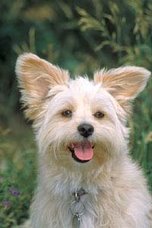Bringing a new puppy home can be very exciting, but in the excitement don't forget the basic needs of your puppy. The way to make sure this does not happen is to have your puppy's supplies on hand before the big day. What are some of the things your puppy will need from the very beginning?
The very basic of supplies that you will need is food. This should be obvious, but you would be surprised at how often this is overlooked. You will need to check with the breeder to find out what food your puppy is already eating. You will need a supply of this type of food. If you are planning to change to a different brand, you will need to gradually change it over the course of about seven to ten days. Just add a little of the new brand to the old brand, adding a little more each day, until your puppy is eating just the new brand.
Of course, to go along with the food, you will need food and water bowls. These need to be made from easy to clean material. They also need to be heavy enough they will not be easily tipped over. Since some breeds chew more than others, you may want to avoid plastic altogether, as these can splinter and cause problems. A set of stainless steal bowls will take care of this problem and they are easy to clean.
After food, one of the most important items you will purchase for your new puppy is his crate. These can be found in many different styles and sizes. If you are bringing home a large breed dog, you will either want to buy a crate that is adjustable or buy several crates in different sizes to accommodate your growing puppy. This crate will become your puppy's special place. This is where he will sleep, stay, and get away from all the household hubbub. This can also be his "safe" place, especially if you have children. This will become your puppy's own little "den". When you purchase your puppy's crate, you should be sure that it is the right size. Your puppy should be able to stand comfortably, turn around, and lie without being cramped. It should not be so large though that your puppy has enough room to relieve himself at one end while having room to sleep at the other, you do not want your puppy to get in the habit of relieving himself in his crate.
When your puppy is ready to be taken outside, you will need to have him in a collar and on a leash. Your puppy's first collar and leash should be made of lightweight nylon or leather. If you start your puppy from the very beginning wearing a collar and leash, it will be less of a challenge when you start training. You will need to make sure the collar fits properly. The way to do this is to add two inches to the puppy's neck size. As your puppy grows you will need to check the collar to make sure it is not to tight. To go along with your puppy's new collar, you will also need to have an identification tag attached. This tag should have your name, address, and telephone number (make sure you include area code). If your puppy was to stray, it could make the difference in you getting him back or not.
Another item to have on hand to use from the very beginning is your grooming tools. Establishing your puppy's grooming routine from the very beginning will eliminate a lot of struggle later on. Your puppy will start to look forward to this time as time spent one on one with you, so make it a special time. The brushes and combs and other grooming supplies will depend on the breed you choose. Check with the breeder to determine which grooming supplies you will need.
Another thing you will need to establish from the very start of your puppy being a part of your family is what he is allowed to play with. Having toys already on hand will help establish his boundaries for what to play with. If you find your puppy playing with something unacceptable, you can very easily distract him with the proper toy, if you already have the toy on hand. Some good toys to consider are any large rawhide piece (chips, logs, or bone shaped), large nylon chews, and hard rubber balls. You want to find something that is made for puppies and cannot be torn apart, swallowed or splinters easily. You will want to avoid any toys that will fit completely into your puppies mouth, this can pose a serious choking hazard. Also, do not use toys that are meant to encourage tugging, these can unintentionally reinforce aggressive behavior. One last note on toys, do not let your new puppy chew on any old shoes or clothing. Puppies do not know the difference between the old things you gave them and any thing they find laying around, to them it is all fair game. Not only the damage that could be done to your pocessions, but this could also cause some serious safety issues for your puppy. Little pieces could be torn off and swallowed, possibly causing obstructions in the digestive tract.
Having a little forethought and doing a little planning before your new family member comes home will make the transition a lot smoother. It is much easier to have what you need on hand before you even need it. There won't be any mad dashes to the store because you were not prepared.
Subscribe to:
Post Comments (Atom)

No comments:
Post a Comment